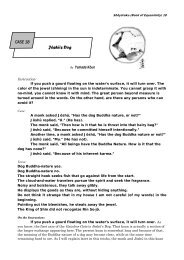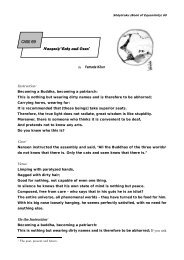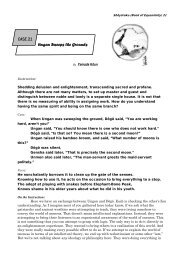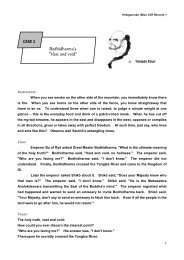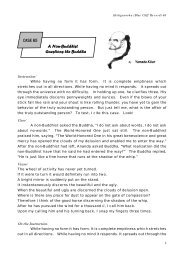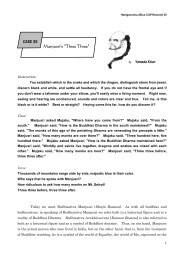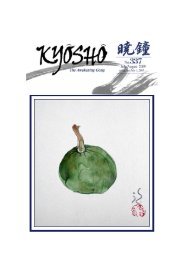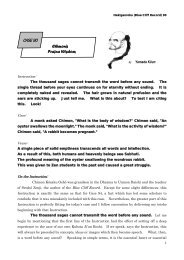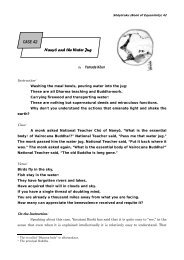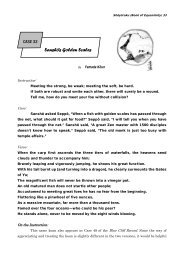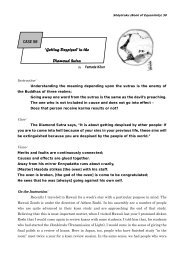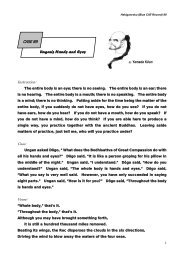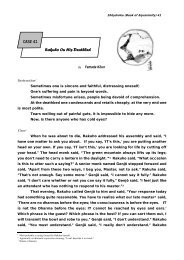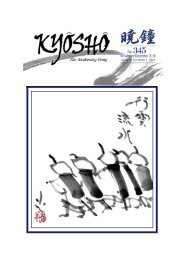Shoyoroku 55
Shoyoroku 55
Shoyoroku 55
Create successful ePaper yourself
Turn your PDF publications into a flip-book with our unique Google optimized e-Paper software.
Shôyôroku (Book of Equanimity) <strong>55</strong>CASE <strong>55</strong>Seppô in Charge of CookingBy Yamada KôunInstruction:Ice is chillier than water, blue comes out of indigo:Only when one’s view excels that of one’s master, it is qualified to betransmitted;If the child is brought up and cannot match the father, the family declinesin one generation. Tell me, who is it that snatches away the activities of one’sfather?Case:Seppô came to Tokusan and became in charge of cooking food. One day,the lunch was late. Tokusan came down to the hall carrying his bowls. Seppô said,“Old Master, the bell has not yet rung nor the drum sounded. Where are you goingwith your bowls?” Thereupon Tokusan went back to his room. Seppô told this toGantô. Gantô said, “Great Tokusan though he is, he has not yet realized the lastword.”Hearing of this, Tokusan sent his attendant to summon Gantô and thenasked him, “Don't you approve of this old monk?” Gantô whispered his intention.Tokusan remained silent.Sure enough, the next day, when Tokusan ascended the rostrum, his talkwas quite different from usual. Gantô, rubbing his hands together, laughed andsaid, “Wonderful! How happy I am that our Old Man has realized the last word.From now on he'll be subject to no one on earth.”Verse:The last word – did you understand it or not?Father Tokusan and his son are terribly unclear.In the assembly there is a guest from south of the River [Yangtze]:Don’t sing the song of partridges in front of him 1 .1A partridge is a bird representing the region south of the Yangtze River [Kônan Region]. The people from that area
Shôyôroku (Book of Equanimity) <strong>55</strong>On the Instruction:Ice is chillier than water, blue comes out of indigo:Only when one’s view excels that of one’s master, it is qualified to betransmitted;If the child is brought up and cannot match the father, the family declinesin one generation. Tell me, who is it that snatches away the activities of one’sfather? This koan also appears as Case 13 in the Gateless Gate, where it has the title TokusanCarries His Bowls. It has traditionally been known as a difficult koan. To explain a little at theoutset where the difficulty lies, it’s a matter of appreciating the merciful spirit of Gantô and theway in which Tokusan and Gantô talk with each other in order to somehow bring Seppô torealization. You have to sense and appreciate that spirit. This has been said from times of old tobe difficult, although it might not be the best thing to tell you at the outset where the difficultylies.Ice is chillier than water, blue comes out of indigo. Blue comes from indigo,but is bluer than indigo, is what this line is saying. Ice comes from water, but it is much colderthan water. Although indigo is the source of the blue, the blue color is bluer than its source.What is this referring to? These statements have their sights set on Gantô in the Main Case.Although Gantô is Tokusan’s disciple, he possesses qualities that are superior even to histeacher.Only when one’s view excels that of one’s master, it is qualified to betransmitted. “View” here is said in the sense of the clarity of one’s dharma eye. It is onlywhen your dharma eye is superior to your master’s in clarity and surpasses it that the dharmacan be transmitted. If you simply parrot what your master said from what you have learned byrote, when it comes to leading your students, it is as described in the continuation of theIntroduction:If the child is brought up and cannot match the father, the family declinesin one generation. It is rare that the child exceeds the father. Because the parents arealready outstanding, you might assume that even more outstanding children will result, butthat is not always the case. In fact, you will have a hard time finding children who are moreoutstanding than their parents. An example of outstanding father and outstanding son inJapan might be Kusunoki Masashige and his son Kusunoki Masatsura, two samurai in the 14 thcentury. Although they were both known for their loyalty, I have the feeling that KusunokiMasashige, the father, was more outstanding, but one cannot know for sure. Goethe hadseveral children, but none of them was particularly outstanding to the point of making theirname in history. They are simply referred to as Goethe’s children. Why do some children turnout well? It’s not due to the father, but more due to the mother. There have been examples ofwere said to become very homesick whenever they heard the song of their home birds. Seppô originally comes fromthe Province of Sen, south of the River.2
Shôyôroku (Book of Equanimity) <strong>55</strong>Zen experience as found in the present-day Soto School had its start with Menzan Zenji. Moremodern examples in the Meiji Period were Nishiari Bokuzan Roshi, Ian Roshi and ProfessorKodô Kurebayashi, all proponents of intellectual Zen. When you actually look through DôgenZenji’s Shôbôgenzô, you definitely find mention of kensho and satori. But scholars were able tomisread those passages and conclude that satori was not necessary. These are members of thecentral stream of the Soto School saying this. I feel that Professor Kurebayashi has a majorresponsibility regarding this. Please recall the words of Dôgen Zenji that always appear at thebeginning of our Kyôshô magazine:It should be known that:The subtle Dharma of the Seven Buddhas is maintained with its true significancewhen it is rightly transmitted by an enlightened disciple following an enlightened master. Thisis beyond the knowing of the priest of letters and learning.The original Japanese uses the word tokudô (attaining the Way) in referring toenlightenment. The enlightened disciple is the one whose mind is one with that of the masterand who “confirms and realizes” (shôe). This is how the dharma is rightly transmitted andpassed on. Monks who merely concern themselves with concepts and learning cannotunderstand this. But here is a professor proclaiming in his writings that enlightenment isunnecessary. Why would he say such a thing? Because satori is definitely no easy matter, asyou all know. Many monks taking care of temples these days disdain having to ferventlypractice zazen, enduring the pain in one’s legs. They lack the firm resolve to clarify the truedharma. Nowadays in the Soto School, it would seem that it is not necessary to summon upsuch resolve. In that case, the Soto School is like the Jôdo Pure Land School or the Ikkô Schoolin which the temple is passed on from father to son. The original monks left home in the senseof living in celibacy. But nowadays most monks marry and have families while taking care oftemples. And of course, they want to pass on the temple to their offspring. With that in mind,the son becomes the disciple of the father, and the temple is passed on within the family. Informer times, only persons who had clearly realized the dharma could become dharmasuccessors. Today, however, the so-called sanmotsu (literally, “three things”) as symbols ofdharma transmission are simply passed on from father to son, appearing to be giving proof ofenlightenment. Dharma succession is then given to young people barely out of school who havehardly practiced zazen. Because the adherents of the temple are ignorant of these practices andhave no rights, the next abbot is decided on without their having anything to do with it. It hasnow been decided that the main temples of Eiheiji and Sôjiji approve this practice. They have tobe able to pass the temples on without any concern for satori. Since this is how things areactually are, we have a sad state of affairs indeed if the main temples don’t care if a situationexists where satori is not necessary, as Professor Kurebayashi is proposing. But this is howthings have been developing up to the present day. This, more than anything else, is proof ofBuddhism’s decline. I’m sure there’s no such problem in Christianity. In that sense,Christianity could be said to be maintaining its original purity as a religion. There can be no4
Shôyôroku (Book of Equanimity) <strong>55</strong>doubt about that. I apologize for talking ill of others, but my main point is that the disciplemust surpass the teacher. In speaking of these lines of the Introduction, Yasutani Roshi saysthat Hyakujô revealed to Ôbaku the circumstances by which Hyakujô once again practicedunder Baso. Upon hearing this, Ôbaku was shaken in his entire frame. It was then that Ôbakutruly realized completely. Hyakujô was a disciple of Baso Dôitsu Zenji, and also appears inother koans, such as the one about the wild duck. It is said that Baso had ninety successors,among which Hyakujô was especially outstanding. As the koan about the wild duck makesclear, it does not say that he came to great enlightenment at that time. He simply had someunderstanding. The story of how he once again came to Baso is a famous one, and it was at thattime that he “broke out the bottom of the bucket” and realized completely. One day, whenHyakujô was acting as attendant (jisha) to Baso, Hyakujô had evidently just returned fromoutside the temple. Baso stared at a whisk (hossu) hanging on the wall.Hyakujo said: Do you use that or do you find it unnecessary?Baso took the hossu and stood there.Then, in response to the question “do you find it unnecessary?” Baso hung the hossu upin the original place.The following is my interpretation about what this exchange is saying.The question “do you use that?” is the phenomenal aspect.The question “do you find it unnecessary?” is the essential world in my opinion.After that the two stood there facing each other.Then it was Baso’s turn to pose Hyakujô a question.Baso said, “Do you use this?”Hyakujô picked up his hossu and held it vertically.Baso asked, “Or do you find it unnecessary?”Hyakujô hung up the hossu in the original place.Hyakujô did the same thing as Baso.Then Baso let out a great shout. It was then that Hyakujô suddenly realized.With his mighty shout, Baso blows away all ideas of phenomenal and essential world.This could be called the great activity of the Rinzai tradition.Later, Hyakujo said to his disciple Ôbaku: “A while ago Master Baso shouted at meloudly. After that my ears were so deaf I could hear nothing for three days!”Some commentators conclude that he is speaking figuratively, but I don’t necessarilyagree. I believe such a thing is possible when one truly realizes great enlightenment. It is saidthat Ôbaku, upon hearing this, shook in his entire frame and stuck out his tongue in a show ofintimidation.Hyakujô said, “Will you become Baso’s disciple or my disciple?”Ôbaku said, “I am your disciple.”This is really the case when it comes to transmitting the true dharma. Baso hadalready passed away by this time. It is not possible to inherit the dharma of a person who is5
Shôyôroku (Book of Equanimity) <strong>55</strong>already dead. “In Zen we speak in terms of “mutual transmission from face to face”(menju-sôzoku).Ôbaku also said, “I wish to carry on your dharma. Otherwise our descendants will becut off.” This has a deep meaning. Hearing this, Hyakujô said, “Just so! Just so!”The one who is his teacher’s equal has diminished his teacher by half. Only a studentwho surpasses his teacher can transmit his teacher’s teaching.These lines in the Introduction, which say basically the same thing, are said inreference to Gantô.Tell me, who is it that snatches away the activities of one’s father? Is theresuch a person? Such a person will now be produced in the example of Gantô.On the Case:Seppô came to Tokusan and became in charge of cooking food. Both Seppôand Gantô were disciples of Tokusan. Seppô was older in years. Gantô was an extraordinaryperson, who could perhaps be seen as the reincarnation of some outstanding person from thepast. At any rate, in modern times we would refer to him as a genius of Zen. But he realizedthat he would come to a bad end through karmic causes and thus refrained from coming to thefore, preferring to stay in the background because he was aware of his karma. And that isreally how things turned out. Even such an outstanding person as Gantô was attacked bythieves and beheaded. To die such a death must surely be the result of karmic relations, wewould have to say. He seems to have had a premonition of things turning out this way. At anyrate, when he was beheaded he let out a great shout that was heard for miles around, it is said,although I don’t know if it’s true or not. It is also said that white blood gushed from thedecapitated corpse. Perhaps this was an attempt to depict the final moments of a great personin dramatic terms. This is the Gantô who appears in today’s koan.Seppô, on the other hand, was a man of great effort who practiced under Tokusan.However, it was due to Gantô that Seppô finally realized great enlightenment. Every time Iread this story I am deeply moved by it. I have told the story of those circumstances manytimes already, and many of you are already familiar with it. Engo Zenji, one of the authors ofthe Blue Cliff Record, was evidently quite fond of that story, although the present koan does notappear in that other collection. Nevertheless, Engo refers to it in his comments to other koansin about two or three places. The most detailed is in reference to Seppô, Gantô and Kassan, allof whom were disciples of Tokusan.Seppô was a truly outstanding person who traveled three times to Tôsu Oshô to engagein Zen exchanges. It is also said that he traveled nine times to Tôzan Gohon Daishi. At any rate,he was a very diligent student of Zen. Later he went to study with Tokusan and finallyexperienced great enlightenment. One time, when he was traveling with Gantô to visit Kassan,they were hit by a major snowstorm and could travel no further. While they were holed upGantô spent the entire day napping. Seppô, on the other hand, sat in zazen from morning to6
Shôyôroku (Book of Equanimity) <strong>55</strong>evening. Here we see the difference between the two. Gantô then scolded Seppô, saying, “Whydon’t you sleep!? You look just like a statue of the Bodhisattva Jizô on a street corner. At thisrate, the women and children of the village will assume you’re something great and becomeyour believers. If you go on like that, the people will assume in the future that you’re the localdeity.”Then Seppô pointed to his chest and said, “I feel unease here. I don’t dare cheatmyself.”Seppô is truly earnest.Gantô said, “I always say that some day you’ll build a cottage on a lonely mountainpeak and expound a great teaching. Yet you still talk like this!”This is similar to what Ryûtan Oshô said about Tokusan.Seppô said, “I’m truly anxious.”Although there were hopes that he would cause Buddhism to flourish greatly, he is stillnot at ease inside.Gantô said, “If that’s really so, then reveal your understanding, and where it is correctI’ll confirm it for you. Where it’s incorrect I’ll root it out.”Seppô proceeded to relate the circumstances of his various experiences.“When I first went to Enkan’s place, I heard him expound on emptiness and form. Atthat time I found an entrance.”Gantô said, “For the next thirty years, don’t speak of this matter again.”That’s because it’s only intellectual thinking that you shouldn’t stick to.Seppô said, “And then I saw Tôzan’s poem that said, ‘Avoid seeking elsewhere, forthat’s far from the Self, now I travel alone, everywhere I meet it, now it’s exactly me, now I’mnot it.’”Gantô said, “If that’s so, you’ll never save yourself.”Far from being able to save others, you won’t even be able to save yourself.Seppô said, “Later I asked Tokusan, ‘Can a student understand the essence of theancient teachings?’ He struck me and said, ‘What did you say?’ At that moment it was like thebottom falling out of a bucket of water.”Then Gantô scolded him again and said, “Haven’t you heard it said that ‘what comes inthrough the front gate isn’t the family jewels’?”What are you doing, simply scraping together the sayings of others?Seppô said, “Then, in the future, what should I do?”This is truly wonderful of Seppô. Although Seppô had already realized all sorts ofexperiences, he still poses this question in complete earnest. It is very common for people whohave finished koan study in the room to become complacent and lose their spirit of seeking theway. You must maintain a spirit of “not yet, not yet” in your practice. Seppô is abundantlyendowed with such a spirit. That’s the reason he ripened into such an outstanding Zen master.In response to Seppô’s question of what he should do, Gantô said, “In the future, if you7
Shôyôroku (Book of Equanimity) <strong>55</strong>want to expound a great teaching, then it must flow forth from your own breast. In the futureyour teaching and mind will cover heaven and earth.”Upon hearing this, Seppô experienced great enlightenment.I am always moved by this story, no matter how many times I read it. Both Seppô andGantô are truly wonderful. The events in today’s koan, however, took place prior to Seppô’sgreat enlightenment experience.To say that Seppô was “in charge of cooking food” means that he was the tenzô, thehead cook of the temple.One day, the lunch was late. Tokusan came down to the hall carrying hisbowls. Seppô said, “Old Master, the bell has not yet rung nor the drum sounded.Where are you going with your bowls?” Thereupon Tokusan went back to hisroom. It is the responsibility of the tenzô to insure that the meals are ready on time. It wasactually Seppô’s fault that the meal was not on time. This is an important responsibility,especially since you are preparing meals for Zen practitioners. Some commentators assumethat Tokusan was coming to scold Seppô for his lateness. I myself don’t feel it’s necessary toread so many things into the text. Tokusan was simply hungry and came to see if the meal wasready. Seppô asks him where he is going with his bowls when the meal is not ready. Hearingthis, Tokusan returned to his room without saying a word. This is a checking point in thedokusan room. You have to be able to feel Tokusan’s state of consciousness. In his younger years,Tokusan was a very stern master. He was probably quite old at the time of today’s koan. This istruly outstanding of him, to be able to quietly return to his room. It’s like a calm sea without asingle wave.Seppô told this to Gantô. Gantô said, “Great Tokusan though he is, he hasnot yet realized the last word.” Seppô evidently felt that he had gotten the best of the oldboss and felt a little proud of himself. He told Gantô what had happened. Gantô told Seppô thatTokusan, great master that he was, had not yet realized “the last word.”Hearing of this, Tokusan sent his attendant to summon Gantô and thenasked him, “Don't you approve of this old monk?” Gantô whispered his intention.Tokusan remained silent. As Yasutani Roshi says in his teisho to this koan, no matter whatthe time or occasion, you can be sure that someone will spill the beans. So Tokusan got wind ofwhat had happened and summoned Gantô to his room. “Is there something you don’t approveabout me?” he wanted to know. Gantô whispered in Tokusan’s ear. But Tokusan didn’t say aword in response.Sure enough, the next day, when Tokusan ascended the rostrum, his talkwas quite different from usual. Gantô, rubbing his hands together, laughed andsaid, “Wonderful! How happy I am that our Old Man has realized the last word.From now on he'll be subject to no one on earth.” You could say that Tokusan andGantô were working together to somehow bring Seppô to enlightenment.There are basically three points in this koan that are taken up for examination in the8
Shôyôroku (Book of Equanimity) <strong>55</strong>dokusan room. The first, as I mentioned, is when Tokusan returns to his room without saying aword. The second is when Gantô whispers his intention to Tokusan. The third is “the lastword.” Recently I wrote in the Opening Comments of the Kyôshô magazine about a certainmonk I met during a recent visit to Singapore. When I arrived at the airport there, among thepeople waiting to greet me was a Chinese monk dressed in yellow robes. I didn’t know him orwhy he had come to greet me, but I expressed my thanks to him. Of course, it wasn’t that hewas attending my sesshin or anything. But after the sesshin I was asked to deliver a publictalk about zazen at a certain hall. I was all ready to depart for the hall when I was told that themonk I had met at the airport wanted to talk briefly with me. He had evidently been living formore than twenty years now in Singapore, where the majority of the population is Chinese.Since I didn’t know any Chinese, we were forced to speak with each other in English. I foundhis English quite difficult to understand. He had brought an interpreter with him so that wecould speak with each other and I called on the services of Paul Shepherd. With the aid of thetwo interpreters I asked him what his question was about. He told me he wanted to ask meabout a koan. When I asked which koan, he told me “Tokusan Carries His Bowls.” I told himthat I was not unfamiliar with the koan and told him there were particular points to beunderstood in the koan. “Oh, is that so?” he said. “Then what is your ‘last word’?” he wanted toknow. What do you think I said in reply? I wonder if I should spill the beans or not. At any rate,this monk said he was in the lineage of Unmon Daishi. The temple where Unmon lived stillexists, and he had been living there, practicing under the tutelage of a certain Kôun Zenji. ButI can imagine that he had had to flee to Singapore twenty years before from Maoist China. Iwas delighted to hear that he was a dharma descendant of Unmon. I had been wondering allthe while what had happened to Zen in Communist China, and was truly happy to meet upwith a dharma descendant of Unmon. I then asked him what his “last word” would be. He stoodthere counting “one, two, three, four, five” and stuck out his hands. I told him that I had toleave now for the lecture and that I was very happy to have made his acquaintance. He stoodthere with a bewildered look on his face.On the Verse:The last word – did you understand it or not?Father Tokusan and his son are terribly unclear.The word “unclear” in the second line means you don’t know what they’retalking about.In the assembly there is a guest from south of the River [Yangtze]:This is referring to Seppô.Don’t sing the song of partridges in front of him. Partridges evidently sing inthe spring, perhaps a bit like the Japanese bush warbler (uguisu). When people hear thepartridges singing, they want to return quickly to their homelands. Case 24 of the GatelessGate concerns “Leaving Speech and Silence Behind” and features the Zen master Fuketsu. In9
Shôyôroku (Book of Equanimity) <strong>55</strong>that koan Fuketsu says, “I constantly think of Kônan in March, where partridges chirp amonghundreds of sweet-scented blossoms.” Perhaps partridges are a famous attraction in the regionknown as Kônan. In March all sorts of flowers bloom, and when people hear the partridgeschirping, they want to return home to their homeland. This line of the today’s verse is referringto Seppô. There is the Zen expression, “returning home and sitting at ease” (kika-onza). Thisrefers to how we all wish to return to our true home. You can think of this koan as a dramaproduced by Gantô and Tokusan. They are spurring on Seppô’s desire to return to his truehome.10



